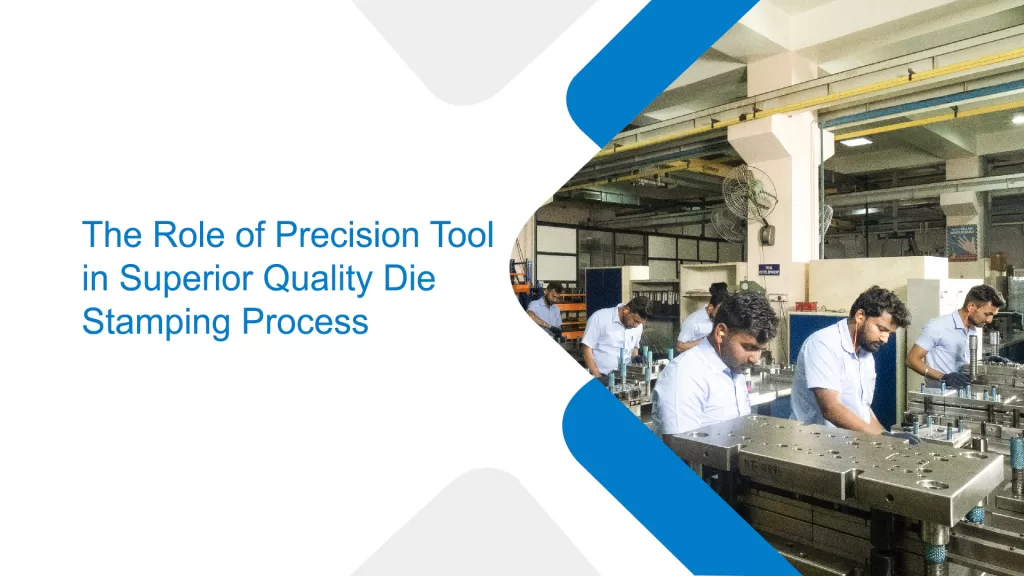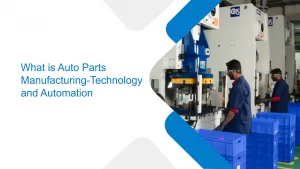The Role of Precision Tool in Superior Quality Die Stamping Process
- Progressive Tooling |
- Nov 15, 2024

Complex items or prototypes frequently require a more advanced process to guarantee proper design. When faced with this problem, producers look for a stamping firm to accomplish a more complex design by utilizing innovative stamping techniques.
Precision tools have become essential in the die stamping process since industries such as electronics and automotive constantly need smaller, more complicated, and higher-quality components. Precision tools guarantee the production line’s efficiency, cost-effectiveness, and precision of stamped components. Below are the roles of precision tools in the high-quality die-stamping process:
Tolerance and Accuracy
Due to precision tools, high standards of accuracy and consistency are achieved during the metal stamping process. The parts that are created must adhere to strict specifications, frequently with tolerances of microns, in industries like aerospace and automotive, where safety is of the utmost importance.
Achieving tight tolerances guarantees that parts fit and operate correctly in assemblies. Tolerances are the permitted variance from a particular dimension. Low-quality or inaccurate tools can result in variations that can lead to parts malfunctioning. The highest requirements are considered while creating precision tools, which help manufacturers maintain tight tolerances while preventing material waste and inefficiencies.
Increasing Speed and Efficiency
Precision stamping tools significantly increase the productivity and efficiency of industrial processes. One high-speed production technique is stamping. With this manufacturing process, a lot of components may be produced quickly.
Precision tools for stamping efficiency can reduce cycle times and increase output rates, reducing overall production time. This efficiency is particularly helpful in high-volume industries where meeting deadlines and reacting quickly to customer demands are essential to staying competitive.
Affordability:
Large die-cast machinery used in mass manufacturing has higher beginning costs than precision metal stamping. Therefore, it is useful when manufacturing needs are relatively high in quantity but modest in volume. This suggests that they can boost their earnings without incurring significant upfront costs.
The value of quality die stamping is found in its affordability, which provides practical solutions for mass production by lowering labor expenses associated with waste and guaranteeing output of a constant high standard.
Reliability and Consistency:
One of the fundamental issues in high-volume stamping is maintaining consistency across millions of components. Precision tools for stamping efficiency make consistent repeatability possible, guaranteeing that every stamping cycle yields identical components. Industries like the electronics and automotive sectors depend on this uniformity, where components must fit into assemblies flawlessly.
Even the smallest details, such as intricate cuts, bends, or punches, can be consistently reproduced across batches thanks to precision tools. This eliminates uncertainty, guarantees product quality, and lessens the need for post-production inspections and modifications.
Accurate Tools and Material Suitability
High-quality die stamping procedures commonly use various materials, from large steel plates to thin aluminum sheets. Tensile strength, hardness, and ductility are just a few of the unique material attributes that must be considered while designing precision tools. Tools not optimized for the material can cause poor finishes, early tool wear, and part failure.
For instance, lighter metals like aluminum can be stamped with less durable tools, but hardened steel requires tools made of carbide or other wear-resistant compounds. Tool selection is essential to preserving die stamping efficiency and quality since the precision and durability of the tools are directly tied to the material being processed.
Cutting Down on Material Waste
Material waste seriously threatens the manufacturing industry’s bottom line and ecology. Precision stamping machinery minimizes waste by making the best use of raw materials. These tools’ ability to precisely cut and shape ensures minimal excess material is used during manufacturing.
Furthermore, multiple pieces can be produced from a single sheet of material using contemporary stamping techniques like progressive die stamping. Waste is reduced as a result.
Making Complex Geometry
Modern products often require components with intricate patterns and complicated geometry. Precision stamping tools for stamping efficiency can accurately produce such complex parts. This expertise is extremely important in the electronics business, where downsizing and the need for complex, multifunctional components are prevalent.
Producing intricate designs without compromising accuracy enables producers to create innovative products that satisfy their clientele’s ever-evolving demands.
Simple to Use:
Engineers and designers love quality die stamping tools because they make complex designs possible with minimal tool adjustments. This functionality also benefits clients by allowing for greater design flexibility. This makes exploring concepts early on in the product development process possible.
Because fewer die changes are needed for each iteration of the part design, it also reduces material waste, saving them money. Because precise metal stamping requires less machining time in following processes during the production run, precisely designed components are easier to create.
Partial Words:
Eigen’s production and precision tool and die design services create unique tooling tailored to your industrial requirements. We put much effort into designing creative and useful solutions that satisfy your cost, accuracy, and production speed demands. Contact us for the best quality die stamping service.
Ujjwal handles crucial roles like AGM Marketing, researcher, and is an author for KDDL – Eigen. He currently works with Eigen for implementing proven techniques and strategies for marketing plans on online and offline platforms. An expert in efficiently executing SEO, SEM, email marketing, social media marketing, PR marketing, Print campaigns, etc. Ujjwal has coordinated an efficient marketing team on various creative campaigns and programmatic buying to support various digital cross-promotion efforts. Implement efficient search optimization strategies with the help of collateral material and metrics.
In his former years, Ujjwal has years of experience in a managerial role for several reputed companies. His years of experience combined with the flair of writing help him come up with result oriented strategies for Eigen.




